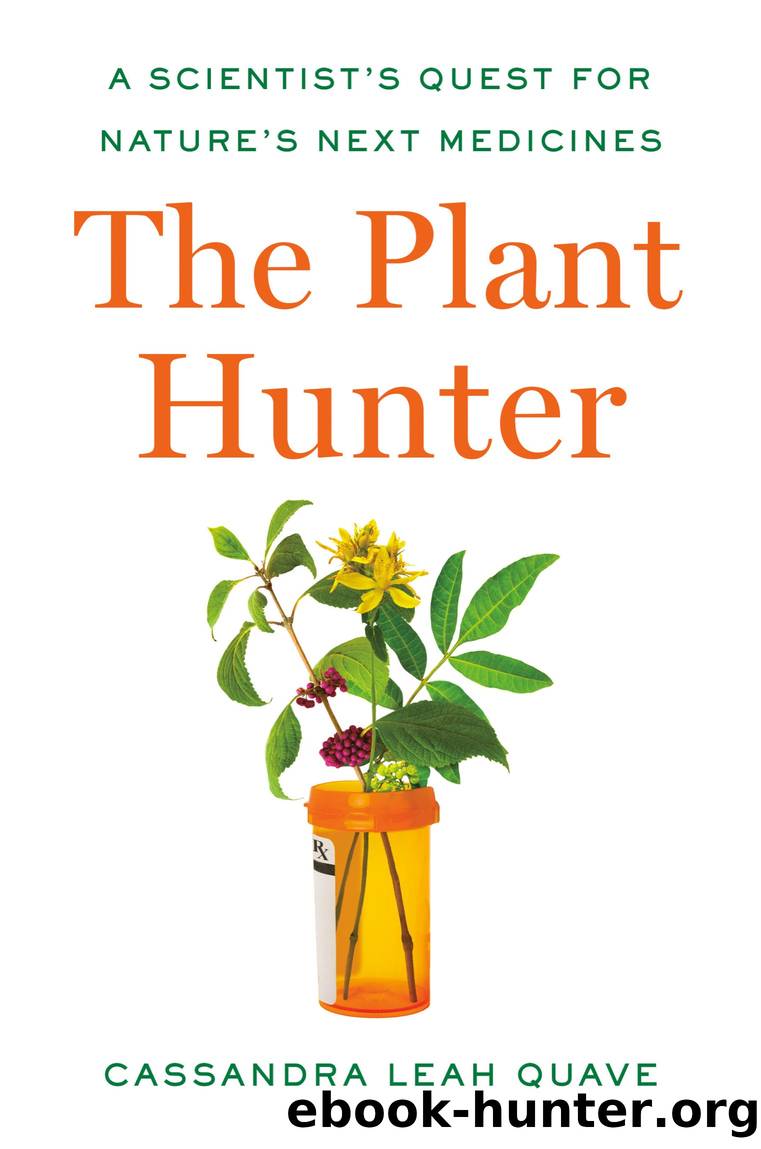The Plant Hunter by Cassandra Leah Quave

Author:Cassandra Leah Quave [Quave, Cassandra Leah]
Language: eng
Format: epub
Publisher: Penguin Publishing Group
Published: 2021-10-12T00:00:00+00:00
* * *
⢠⢠â¢
While I was relishing the progress I was making at the lab bench, I was struggling to fit in with my peers. Working in a basic sciences department was a new experience for me, and I found it difficult to connect with my lab mates. I was an outsider from day one. These other scientists didnât feel like my people.
My desire to take a multidisciplinary approach to nearly every question I investigated made me a very odd duck in a traditional scientific environment. I wanted to appreciate the magic behind ritual healing while also investigating the chemical mechanisms by which the plant ingredients in such processes worked. My lab mates wanted to understand the purpose of what each gene in the microbe served. To be clear, translational science is built on the foundations of basic science; my work wouldnât be possible without those studies and mechanistic insights they illuminate. Itâs just that my mind didnât work that way.
But I also quickly discovered how much my approach differed from that of antibiotic drugâdiscovery scientists. Other scientists developed specialized cellular assays to screen libraries of lab-made compounds in search of drug leads. To me, though, those chemical libraries were irritating and boring. I wasnât interested in compounds with little structural diversity made out of the minds of humansâI wanted to explore the compounds made by nature, a domain still largely untouched by even the most intrepid of scientific explorers.
There was really only one group of people who understood me. Ever since that first ethnobiology conference in Athens, Georgia, where Iâd met Andrea, I knew Iâd found my people. Throughout graduate school, Brad had encouraged my attendance at the annual meetings of the Society for Economic Botany (SEB); there, I began to form lifelong connections with friends and colleagues, ethnobotanists and ethnobiologists who dedicated their careers to investigating the myriad and often mysterious ways that humankind connected to nature for survival and for the enrichment of life in art, music, medicine, and more. It was through those early experiences that I learned about the Open Science Network (OSN) in Ethnobiology, a National Science Foundationâfunded initiative to train upcoming science educators and develop curricula to be shared on an open and accessible platform on the web, which was a novel concept at the time.
The OSN held educator-training workshops at the SEB meetings, and I learned from incredibly experienced educators as well as the young cohort members who participated in the network. I owe much of my current teaching skills to this training period. It certainly hadnât come from my brief stint as a middle-school teacher or even from graduate school, where Iâd been taught only the most basic pedagogical techniques. Back then I was more worried about a student accidentally blowing up the teaching lab than whether or not I had provided a detailed and useful rubric. To be fair, my worries about lab explosions werenât unfounded. One student did in fact catch on fire by spilling ethanol on their
Download
This site does not store any files on its server. We only index and link to content provided by other sites. Please contact the content providers to delete copyright contents if any and email us, we'll remove relevant links or contents immediately.
Sapiens: A Brief History of Humankind by Yuval Noah Harari(13037)
The Tidewater Tales by John Barth(12026)
Do No Harm Stories of Life, Death and Brain Surgery by Henry Marsh(6332)
Mastermind: How to Think Like Sherlock Holmes by Maria Konnikova(6224)
The Thirst by Nesbo Jo(5778)
Why We Sleep: Unlocking the Power of Sleep and Dreams by Matthew Walker(5636)
Sapiens by Yuval Noah Harari(4528)
Life 3.0: Being Human in the Age of Artificial Intelligence by Tegmark Max(4492)
The Longevity Diet by Valter Longo(4443)
The Rules Do Not Apply by Ariel Levy(3897)
The Immortal Life of Henrietta Lacks by Rebecca Skloot(3820)
The Body: A Guide for Occupants by Bill Bryson(3789)
Why We Sleep by Matthew Walker(3767)
Animal Frequency by Melissa Alvarez(3750)
Yoga Anatomy by Kaminoff Leslie(3696)
Barron's AP Biology by Goldberg M.S. Deborah T(3628)
The Hacking of the American Mind by Robert H. Lustig(3575)
All Creatures Great and Small by James Herriot(3506)
Yoga Anatomy by Leslie Kaminoff & Amy Matthews(3392)
